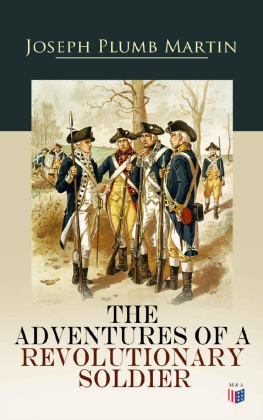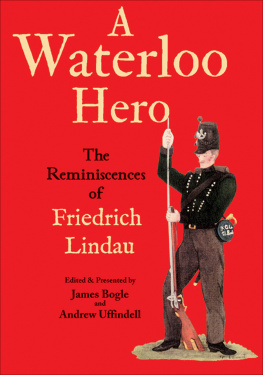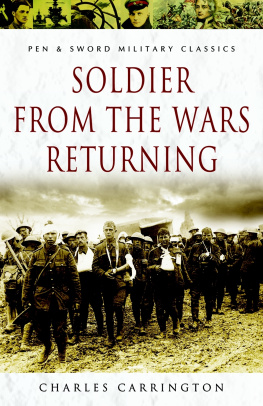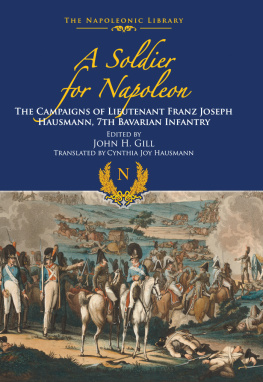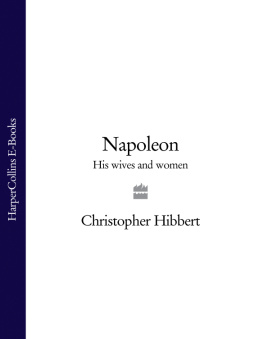A Soldier of the Seventy-First: From de la Plata to the Battle of Waterloo,
18061815
This edition published in 2010 by Frontline Books, an imprint of Pen & Sword Books Limited, 47 Church Street, Barnsley, S. Yorkshire, S70 2AS
www.frontline-books.com
Copyright Pen & Sword Books Ltd, 2010
The Journal of a Soldier of the 71st or Glasgow Regiment, Highland Light Infantry from 18061815 appears to have been published in Edinburgh in 1819, though no copy is extant. It was reissued in 1831 by Constable (Edinburgh). The most recent version, edited by Christopher Hibbert, was published in abridged form by Leo Cooper in 1975. This edition is based upon the full text of the 1831 edition, and includes a new introduction by Stuart Reid, who also edited the text.
ISBN: 978-1-84832-561-6
Digital Edition ISBN: 978-1-78346-152-3
All rights reserved. No part of this publication may be reproduced, stored in or introduced into a retrieval system, or transmitted, in any form, or by any means (electronic, mechanical, photocopying, recording or otherwise) without the prior written permission of the publisher. Any person who does any unauthorized act in relation to this publication may be liable to criminal prosecution and civil claims for damages.
A CIP data record for this title is available from the British Library.
For more information on our books, please visit
or write to us at the above address.
Typeset by JCS Publishing Services Ltd, www.jcs-publishing.co.uk
Printed in the UK by MPG Books Limited
C ONTENTS
For Tom; a book about a namesake
I NTRODUCTION
The Journal of a Soldier of the 71st or Glasgow Regiment, Highland Light Infantry from 18061815 was originally published in Edinburgh in 1819. It probably appeared as a part work in one of the many literary magazines of the day since no trace of that initial edition can be found, but it deservedly caught the public imagination and soon went through the first of a succession of book editions.
Latterly publishers have relied upon an abridged version, edited by Christopher Hibbert in 1975, but the present one is based upon the full text of the 1831 edition, published by Constable in Edinburgh.
Other than referring to himself as Thomas, the author has until now been anonymous, although the editor is known to have been a man named John Howell. Although he himself is sometimes carelessly identified as the soldier in question, Howell, born in Edinburgh in 1788, never served with the 71st or with any other regiment for that matter, but was an Edinburgh-based hack writer, publisher and occasional inventor. His known works include An Essay on the War-Galleys of the Ancients (1826), The Life and Adventures of Alexander Selkirk (1829), The Life of Alexander Alexander (1830) and The Life of John Nichol, the Mariner. He contributed several stories to John Mackay Wilsons Tales of the Borders (183540).
This present book is, however, undoubtedly his most important, and according to an inscription which he left in a copy of the third edition (now in the possession of the Royal Highland Fusiliers) James Todd is the individual I got the greater part of the journal from.
At first sight that statement seems straightforward enough, for as it turns out there was indeed a man named James Todd serving in the 71st during the Napoleonic Wars. However, there is still a major problem with this easy identification, for Howell then went on to say that: When he (Todd) left me I got one Archd. [Archibald] Gavin to fill in any part we had missed and to establish any fact I doubted I had recourse to the testimony of a party of the 71st at the time in Edin. Clearly therefore it was a composite effort and, as we shall shortly see, the evidence of the 71st muster rolls leaves no doubt whatsoever that the Thomas of the journal who went to South America and Private James Todd are not one and the same man. Nevertheless, there is no doubting that their individual stories are authentic, and so we will start at the beginning.
1
THE Writers parentage and education Attempts the Stage, and fails Joins a recruiting party, and sails for the Isle of Wight Adventure there.
From motives of delicacy, which the narrative will explain, I choose to conceal my name, the knowledge of which can be of little importance to the reader. I pledge myself to write nothing but what came under my own observation, and what I was personally engaged in.
I was born of poor but respectable parents, in Edinburgh, who bestowed upon me an education superior to my rank in life. It was their ambition to educate me for one of the learned professions; my mother wishing me to be a clergyman, my father, to be a writer. They kept from themselves many comforts, that I might appear genteel, and attend the best schools: my brothers and sister did not appear to belong to the same family. My parents had three children, two boys and a girl, besides myself. On me alone was lavished all their care. My brothers, John and William, could read and write, and, at the age of twelve years, were bound apprentices to trades. My sister Jane was made, at home, a servant of all-work, to assist my mother. I alone was a gentleman in a house of poverty.
My father had, for some time, been in a bad state of health, and unable to follow his usual employment. I was unable to earn any thing for our support. In fact, I was a burden upon the family. The only certain income we had was the board of my two brothers, and a weekly allowance from a benefit society, of which my father was a member. The whole sum was five shillings for my brothers, and six from the society, which were soon to be reduced to three, as the time of full sick-money was almost expired.
I do confess (as I intend to conceal nothing) this distressed state of affairs softened not my heart. I became sullen and discontented at the abridgment of my usual comforts; and, unnatural wretch that I was! I vented that spleen upon my already too distressed parents. My former studies were no longer followed, for want of means to appear as I was wont. That innate principle of exertion, that can make a man struggle with, and support him in the greatest difficulties, had been stifled in me by indulgence and indolence. I forsook my former school-fellows, and got acquainted with others, alas! not for the better.
I was now sixteen years of ageentreaties of my father, I hurried to ruin. I was seldom at home, as my parents constantly remonstrated with me on the folly of my proceedings. This I could not endure: I had been encouraged and assisted by them in all my former whims. All my undertakings were looked upon by them as the doings of a superior genius. To be crossed now, I thought the most unjust and cruel treatment.
I had, through the interference of my new acquaintances, got introduced to the Manager of the Theatre at Edinburgh, who was pleased with my manner and appearance. The day was fixed on which I was to make my trial. I had now attained the summit of my first ambition. I had not the most distant doubt of my success. Universal applause, crowded houses, and wealth, all danced before my imagination. Intoxicated with joy, I went home to my parents. Never shall the agony of their looks be effaced from my memory. My mothers grief was loud and heart-rending, but my fathers harrowed up my very soul. It was the look of despair the expression of his blasted prospects prospects he had so long looked forward to with hope and joy hopes, that had supported him in all his toil and privations, crushed in the dust. It was too much; his eyes at length filled with tears, and, raising them to heaven, he only said, or rather groaned, God, thy ways are just and wise; thou hast seen it necessary to punish my foolish partiality and pride: but, O God! forgive the instrument of my punishment. Must I confess, I turned upon my heel, and said, with the most cool indifference, (so much had the indulgence of my former life blunted my feelings towards my parents), When I am courted and praised by all, and have made you independent, you will think otherwise of my choice. Never, never, he replied; you bring my gray hairs with sorrow to the grave. Thomas, Thomas, you will have our deaths to answer for, was all my mother could say; tears and sobs choked her utterance.


